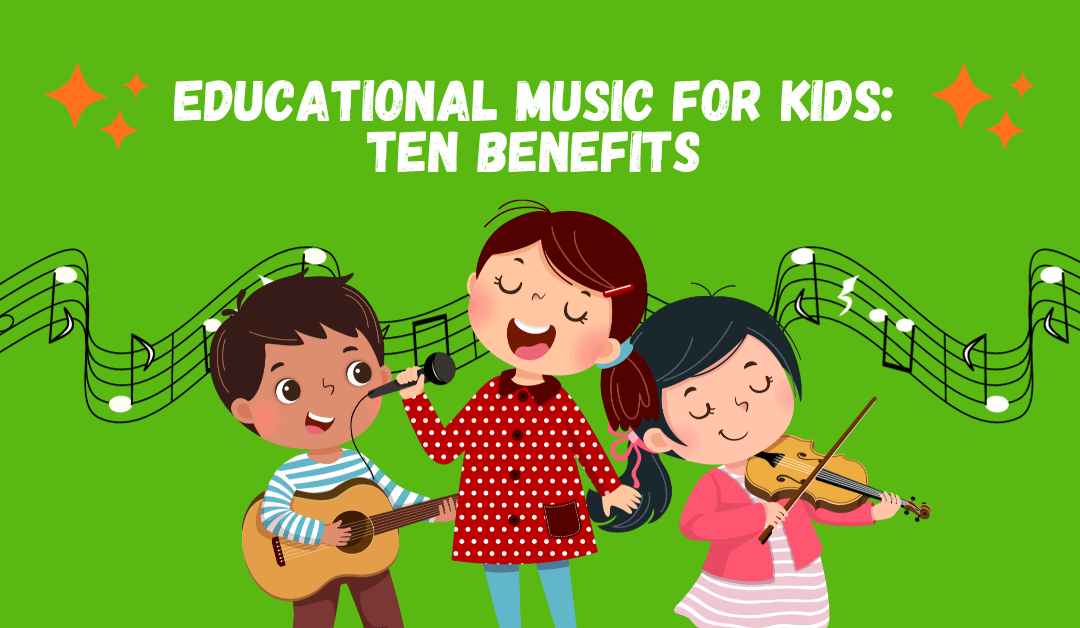
by admin | Feb 13, 2021 | Uncategorized
Music Education is an integral part of a comprehensive education for children. It helps to develop creativity, stimulates the brain, and exposes students to various musical styles, techniques, and cultures. Music can also be an excellent way to express emotion and connect with others in meaningful ways.
This article will discuss ten benefits music education has for kids.
Why is Music Education Beneficial for Kids?
- Improved Academic Performance:
Music has been found to impact academic performance, particularly in math and reading, positively. Studies show that music can help students increase their understanding of concepts and improve their test scores. This is likely since music requires concentration, focus, and attention — all skills necessary for academic success.
- Enhanced Social Skills:
Music can help kids build better relationships with their peers. Learning and playing music together is a great way to foster cooperation, collaboration, respect, and communication.
- Developing Creativity:
Music encourages creativity in many different ways. In addition to creating and exploring melodies and rhythms, students can learn how to arrange and compose their pieces of music. This creative process can be a great way to express emotion and explore personal interests.
- Better Self-Esteem:
Music is an excellent medium for self-expression, allowing kids to practice developing confidence in their abilities. As they become more proficient at playing an instrument or singing, they can take pride in their accomplishments and create a better sense of self-worth.
- Improved Memory:
Music education is associated with improved memory, especially regarding the recall of facts and concepts. This could be because music involves memorizing patterns, rhythms, and melodies — making it easier for students to remember information.
- Increased Cognitive Development:
Music can help kids develop their cognitive skills. Not only does it require concentration and focus, it also involves using both hemispheres of the brain. Furthermore, music can stimulate different areas of the brain, which can help improve problem-solving skills and analytical ability.
- Emotional Development:
Music can evoke powerful emotions, which can help children understand and express their feelings. Whether it’s through singing, playing an instrument, or listening to a favorite song, music can provide a safe outlet for children to express their emotions and healthily process them.
- Cultural Awareness:
Music education exposes children to various musical styles, cultures, and traditions worldwide. This can help children appreciate human culture’s diversity and develop a greater understanding and respect for different societies.
- Fine Motor Skills Development:
Playing a musical instrument requires fine motor skills, such as dexterity and hand-eye coordination. This can help children to develop these skills, which can transfer to other areas of their lives, such as sports and writing.
- Physical Health:
Studies have shown that playing music can help to reduce stress and promote physical health. Playing an instrument can help lower blood pressure, improve heart rate, and release endorphins, often called “feel-good” hormones.
In conclusion, music education has a wide range of benefits for children. It helps to improve academic performance, enhances social skills, develops creativity, and benefits emotional, cognitive, and physical health.
It’s essential to consider factors such as age-appropriateness, content, and message when choosing music for kids. Choosing songs with uplifting beats and thought-provoking messages, like Club Baby’s latest collection of nursery rhymes, can help promote physical, emotional, and cognitive growth in kids.
Music education can also help children develop an appreciation for different cultures and fine motor skills. As a parent, exposing your child to music from an early age is crucial as encouraging them to participate in music classes or lessons, which can have a lasting impact on their overall development.
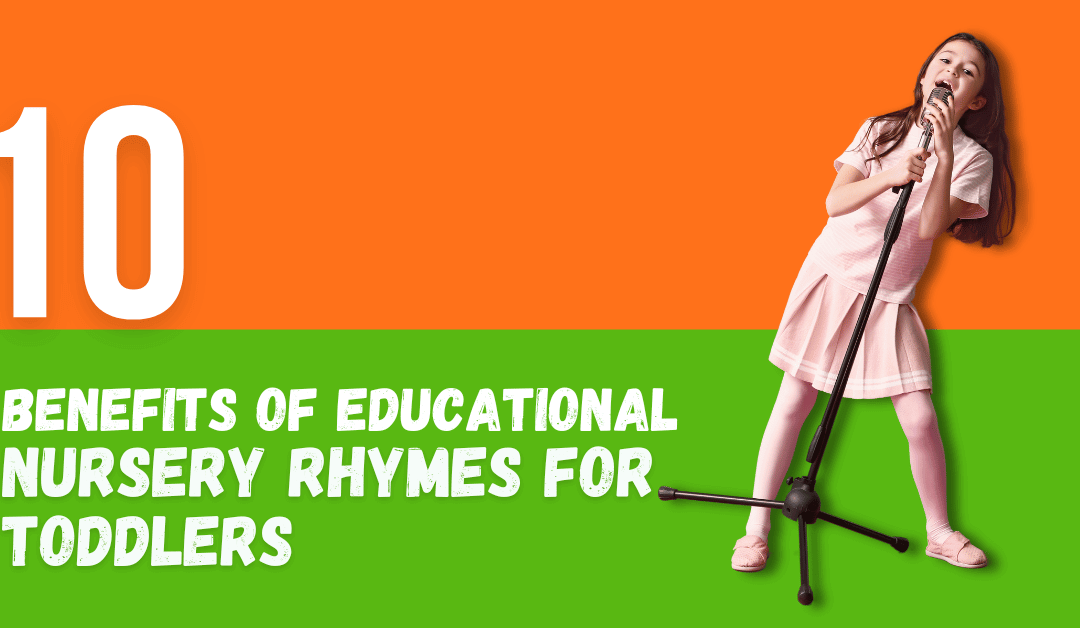
by admin | Jan 13, 2021 | Uncategorized
Nursery rhymes have been a beloved part of childhood for centuries, providing a wide range of benefits that extend beyond just entertainment. From boosting language skills to promoting creativity and imagination, nursery rhymes are essential to a child’s development.
Toddler Nursery Rhymes Offer 10 Benefits
Here are the top 10 benefits of educational nursery rhymes for toddlers:
- The Perfect Introduction to Literature:Nursery rhymes are easy for young minds to understand and remember, making them the perfect first story for children. They also help to develop vocabulary and language skills.
- Early Language Development: Nursery rhymes help children learn about rhyme, rhythm, and repetition, which are crucial for reading and writing.
- Sense of Community:Participating in nursery rhymes can help children feel connected to others and their cultural heritage, and sharing them can be a bonding experience.
- Improved Memory and Concentration:The repetitive nature of nursery rhymes makes them easy to remember, and the catchy tunes can hold a child’s attention, leading to better concentration and attention span.
- Promoting Creativity and Imagination:Nursery rhymes often contain colorful characters, animals, and landscapes, which can inspire children to create their own stories and worlds in their minds.
- Self-Expression:Nursery rhymes can be a valuable tool for children to express their emotions and provide comfort and security.
- Improved Cognitive Development:Nursery rhymes can help children develop their cognitive skills, problem-solving, and analytical abilities.
- Emotional Development:Music can evoke powerful emotions, which can help children understand and express their own feelings.
- Cultural Awareness:Music education exposes children to various musical styles, cultures, and traditions worldwide.
- Fine Motor Skills Development: Playing a musical instrument requires fine motor skills, such as dexterity and hand-eye coordination, and nursery rhymes can be a great way to encourage the development of these skills.
When selecting music for kids, it’s essential to consider factors such as age-appropriateness, content, and message. Choosing songs with uplifting beats and thought-provoking messages, like Club Baby’s latest collection of nursery rhymes, can help promote physical, emotional, and cognitive growth in kids. By exposing children to age-appropriate musical genres, parents can ensure that their kids are exposed to positive messages and sounds that inspire their creativity and facilitate healthy social relationships. Ultimately, music can broaden a child’s understanding and appreciation of their surroundings.
In addition to being enjoyable and entertaining, music can be a potent tool in a child’s development! When promoting educational growth in toddlers, nursery rhymes are one of the best ways.
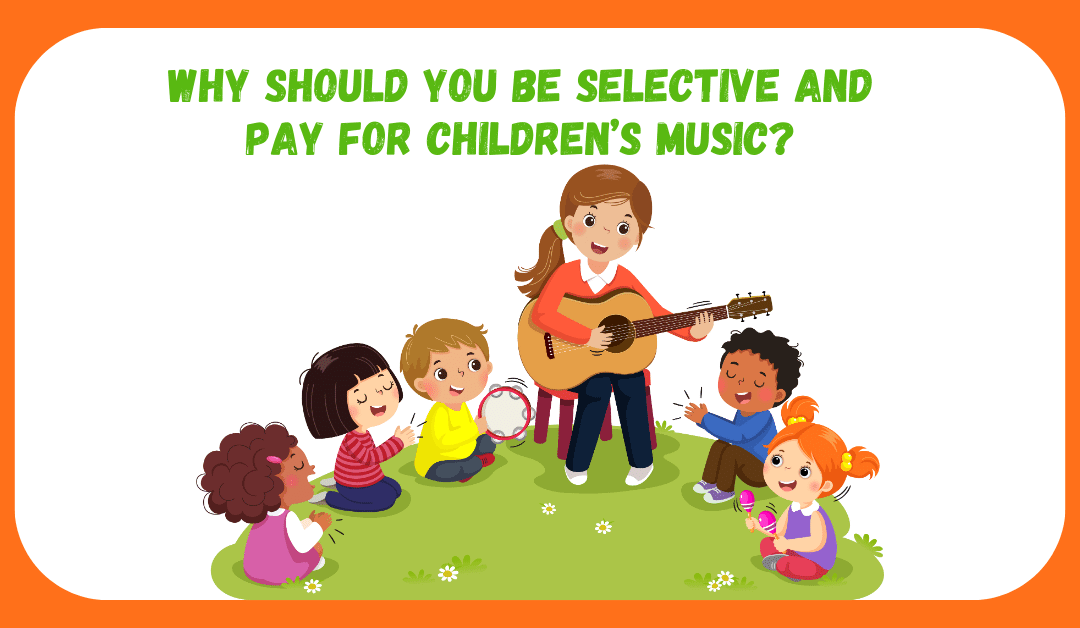
by admin | Dec 9, 2020 | Uncategorized
As a parent, it’s natural to want to provide your children with the best experiences and opportunities. This includes the music they listen to, which can have a significant impact on their development and well-being. While it may be tempting to simply turn on the radio or play free, easily accessible music for your children, it’s important to be selective and consider the potential benefits of paying for children’s music.
In this article, we will explore the reasons why it’s important to be selective about the music your children are exposed to and why it’s essential to credit and support artists.
The Importance of Being Selective About Children’s Music
There are several reasons why it’s important to be selective about the music your children are exposed to. For one, the lyrics and themes of some songs may not be suitable or age-appropriate for children. For example, songs with explicit or violent lyrics may not be suitable for young ears. By choosing music that is appropriate for your child’s age and development level, you can ensure that they are exposed to positive and age-appropriate messages.Music with thoughtful messages such as unique nursery rhymes from Clubbaby’s latest collection with uplifting beats and stimulating instrumentals can all help promote a child’s physical, emotional and cognitive development.
In addition to the content of the music, it’s also important to consider the quality of the music itself. Some music may be poorly produced or lack engaging melodies or lyrics, which can be less enjoyable or beneficial for children. By paying for children’s music, you can ensure that you are providing your children with high-quality, well-produced music that will be more enjoyable and beneficial for them.
The Importance of Credit and Support for Artists
Another reason to pay for children’s music is to credit and support artists. Many musicians and artists rely on the income from their music to support themselves and their families. By choosing to pay for children’s music, you can help support these artists and ensure that they can continue to create and share their music.
In addition to supporting the financial well-being of artists, paying for music also helps to ensure that they can continue to create and share their art. Without financial support, many artists may be unable to devote their time and energy to creating new music, which can limit the variety and diversity of music available to children. By paying for children’s music, you can help support the creation of new, diverse music for your children to enjoy.
In conclusion, it’s important to be selective about the music your children are exposed to and to pay for children’s music for several reasons. By choosing age-appropriate and high-quality music, you can ensure that your children are exposed to positive and enjoyable music. Additionally, paying for children’s music helps to credit and support artists, ensuring that they can continue to create and share their art. By being selective and paying for children’s music, you can help provide your children with the best experiences and opportunities and support the music industry at the same time.
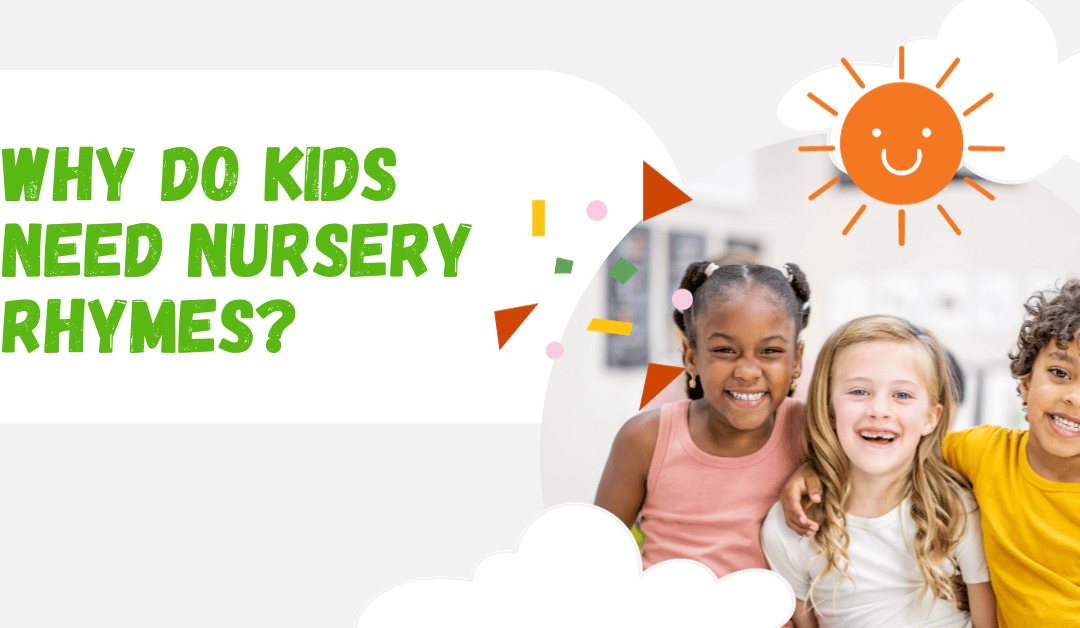
by admin | Nov 9, 2020 | Uncategorized
For centuries, nursery rhymes have been an integral part of childhood education, and many adults still recall their own favorites. Children need nursery rhymes for a variety of reasons, but why is that?
In this article, we will explore the benefits of nursery rhymes and why they are an essential part of a child’s development.
Benefits of Educational Nursery Rhymes for Toddlers
The Perfect First Story
For many children, nursery rhymes are their first introduction to the world of literature. These simple, catchy poems and songs are easy for young minds to understand and remember, making them the perfect first story for children. Nursery rhymes can also help children develop their vocabulary and language skills, as they introduce new words and concepts in a fun and engaging way.
Boost Early Language Development
Nursery rhymes are an excellent tool for boosting early language development in children. They help children learn about rhyme, rhythm, and repetition, which are all important elements in reading and writing. Nursery rhymes also encourage children to listen and speak, as they involve singing, chanting, and recitation. By participating in nursery rhymes, children can improve their listening, speaking, and communication skills.
Sense of Community
Nursery rhymes can also help children feel a sense of community and belonging. These simple poems and songs are enjoyed by children all around the world, and participating in nursery rhymes can help children feel connected to others and to their cultural heritage. Sharing nursery rhymes with friends and family can also be a bonding experience, strengthening relationships and promoting a sense of togetherness.
Enhancing Memory and Concentration
Nursery rhymes can also help children improve their memory and concentration. The repetitive nature of nursery rhymes makes them easy for children to remember, which can help them develop their memory skills. Additionally, the catchy tunes and rhythms of nursery rhymes can help hold a child’s attention and focus, leading to better concentration and attention span.
Promoting Creativity and Imagination
Nursery rhymes can also be a great way to encourage children to use their creativity and imagination. These simple poems and songs often contain colorful characters, animals, and landscapes, which can inspire children to create their own stories and worlds in their minds. Participating in nursery rhymes can help children learn to think creatively and use their imaginations.
Helping Children Express Themselves
Nursery rhymes can also be a valuable tool for children to express themselves and their emotions. Many nursery rhymes contain themes that children can relate to, such as love, friendship, and happiness. Singing or reciting these rhymes can help children express their feelings and emotions, and can even provide a sense of comfort and security.
Conclusion:
In conclusion, nursery rhymes are an essential part of a child’s development. They provide a perfect first story, boost early language skills, promote a sense of community, enhance memory and concentration, encourage creativity and imagination, and help children express themselves. These simple, catchy poems and songs are an integral part of childhood and will continue to be enjoyed by children for generations to come.
When selecting music for kids, it’s important to consider factors such as age-appropriateness, content, and message. Choosing songs with uplifting beats and thought-provoking messages, like Clubbaby’s latest collection of nursery rhymes, can help promote physical, emotional, and cognitive growth in kids.
By exposing children to age-appropriate musical genres, parents can ensure that their kids are exposed to positive messages and sounds that will inspire their creativity and facilitate healthy social relationships. Ultimately, music can broaden a child’s understanding and appreciation of their surroundings.
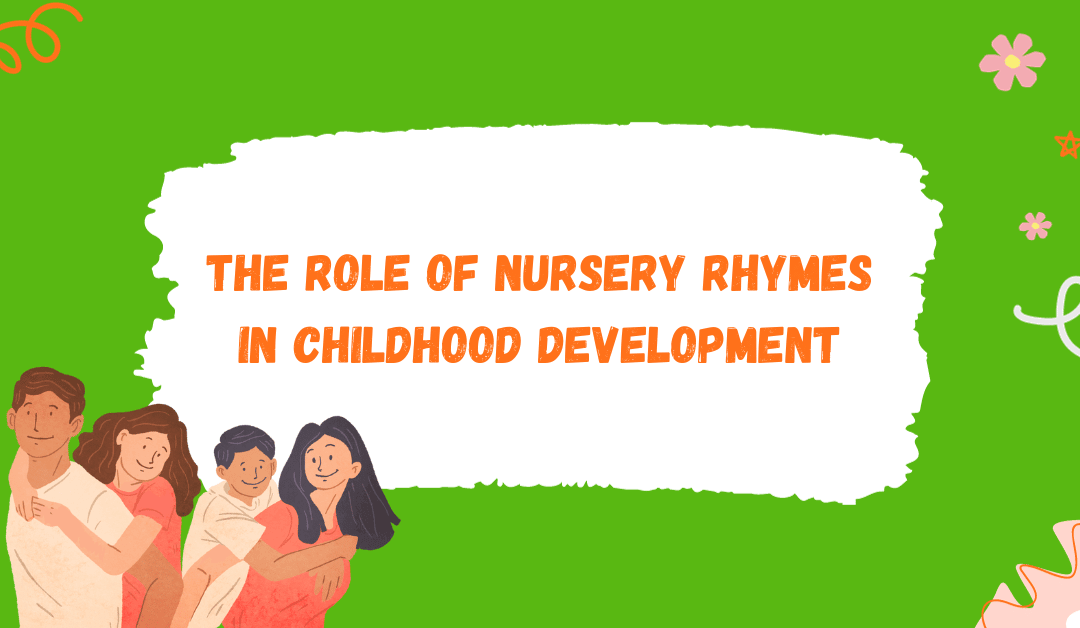
by admin | Oct 9, 2020 | Uncategorized
Nursery rhymes are an important aspect of a child’s early education and development. They help children develop their language skills, improve their memory and concentration, and encourage creativity and imagination. Nursery rhymes also provide a way for children to learn about rhythm, rhyme, and repetition, which are important elements in reading and writing. These simple, catchy poems and songs have been passed down from generation to generation, and are enjoyed by children all around the world. But do nursery rhymes have an impact on a child’s mental health as well?
In this article, we will explore the potential benefits and drawbacks of nursery rhymes on a child’s mental well-being.
The Benefits of Nursery Rhymes on Mental Health
There are several ways in which nursery rhymes can have a positive impact on a child’s mental health. For one, they provide a sense of security and familiarity, which can be particularly comforting for young children. Nursery rhymes also help children develop social skills, as they can be sung and shared with others. Additionally, the playful, rhythmic nature of nursery rhymes can help reduce stress and anxiety in children, and promote a sense of joy and happiness.
The Potential Negative Effects of Nursery Rhymes on Mental Health
However, it’s important to recognize that there are also potential drawbacks to nursery rhymes. Some nursery rhymes contain violent or disturbing themes, such as “Rock-a-bye Baby,” which refers to a baby being placed in a tree and threatened by the wind. While these themes may not be explicitly harmful to a child’s mental health, they can still be unsettling or confusing for young minds. It’s important for parents to be mindful of the nursery rhymes they choose to share with their children, and to be prepared to discuss any potentially concerning themes that may arise.
How to Incorporate Nursery Rhymes into Your Child’s Routine in a Positive Way?
Despite the potential drawbacks, nursery rhymes can still be a valuable and enjoyable part of a child’s life. Here are a few tips for incorporating nursery rhymes into your child’s routine in a positive way:
- Choose nursery rhymes that are age-appropriate: Some nursery rhymes may contain themes or language that may not be suitable for younger children. Be sure to choose nursery rhymes that are appropriate for your child’s age and development level.
- Discuss any confusing or concerning themes: If your child comes across a nursery rhyme with a theme that they don’t understand or that makes them feel uncomfortable, take the time to talk about it with them. This can help your child process their feelings and ask any questions they may have.
- Use nursery rhymes as a bonding activity: Nursery rhymes are a great way to connect with your child and spend quality time together. Singing or reciting nursery rhymes with your child can create a sense of closeness and promote positive mental health.
Balancing the Pros and Cons of Nursery Rhymes
Nursery rhymes can be a valuable and enjoyable part of a child’s education and development, but it’s important to be mindful of the potential drawbacks as well. By choosing age-appropriate nursery rhymes and discussing any confusing or concerning themes with your child, you can help ensure that nursery rhymes have a positive impact on your child’s mental health. The age-appropriateness, content, and overall message of the songs should be considered when selecting music for kids. In addition to uplifting beats and stimulating instrumentals, music with thoughtful messages like those from Clubbaby’s latest collection can enhance a child’s physical, emotional, and intellectual development.
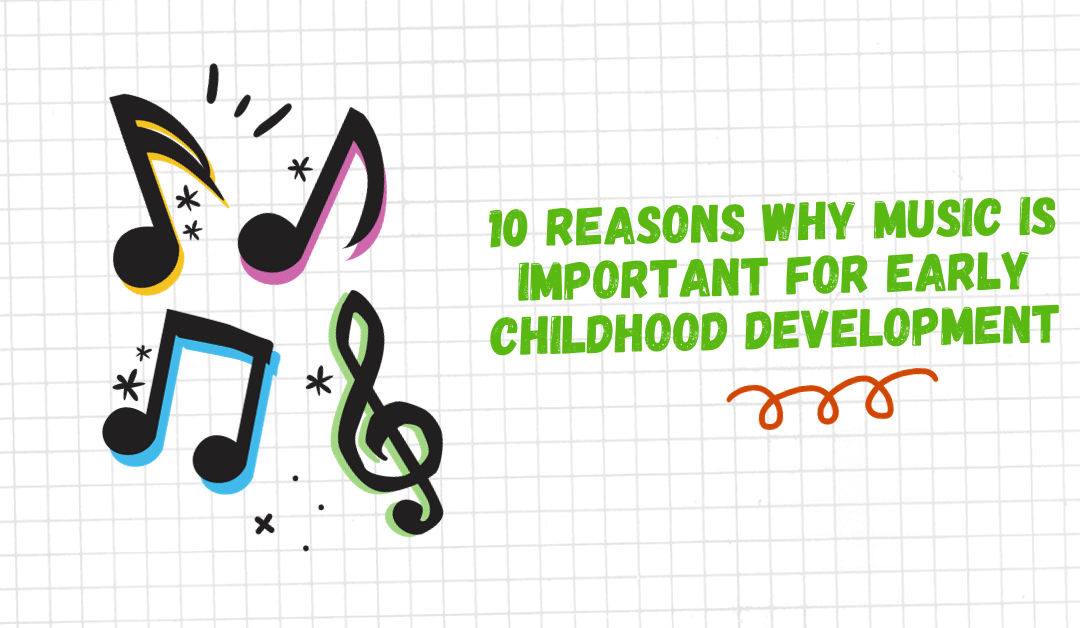
by admin | Sep 9, 2020 | Uncategorized
Music is a powerful tool for increasing a child’s sensory development, as it stimulates all of their senses at once. Children can see the movement of the musician, feel the vibration of the music, and hear the different sounds and melodies. This multisensory experience helps children to better understand and make sense of the world around them.
Let’s look into different ways music affects toddlers and young children in terms of their intellectual and emotional development.
Let’s begin!
Children and Music: Effects of Music on Child Development
Betters IQ
Studies have also shown that children who participate in music programs regularly can develop higher IQs than those who don’t. This is because participating in music requires the use of multiple skills and the coordination of different parts of the brain, which helps to boost cognitive development.
Improves memory
Music has been shown to improve memory in children, as it helps to strengthen the connections between neurons in the brain. This can lead to better memory retention and recall, as well as improved cognitive functioning.
Facilitates language development
Music plays a crucial role in language development in children. Singing songs with children helps to increase their vocabulary and improve their listening skills, as they learn to distinguish different sounds and rhythms. In addition, children who learn to play musical instruments are more likely to excel in language-based subjects, such as reading and writing.
Enhances social skills
Music is a social activity, and participating in musical activities with others can help children to develop their social skills. Children learn to take turns, listen to others, and work as a team when participating in musical activities, which can translate to better social skills in other areas of their lives.
Fosters creativity and self-expression
Music provides children with a platform to express themselves and be creative. Whether they are singing, playing an instrument, or simply listening to music, children can use music to explore their emotions and express themselves in a way that words cannot.
Improves physical coordination
Playing a musical instrument requires precise physical coordination, as children must use their fingers to press down on the keys or strings in a specific order. This improved physical coordination can translate to better hand-eye coordination and fine motor skills in other areas of their lives.
Helps children to relax and de-stress
Music has a calming effect on children, and listening to soothing melodies can help to reduce stress and anxiety. This can be particularly beneficial for children with developmental delays or special needs, as music can provide a sense of comfort and calm.
Expands communication & imagination
Music helps children to develop better communication skills and encourages them to use their imaginations. As they listen to and create music, children can explore new ideas and themes, as well as immerse themselves in a world of creativity.
In conclusion, music is an important aspect of early childhood development, as it stimulates multiple senses, improves memory and language skills, fosters creativity and self-expression, and even boosts IQ. Encourage your child to participate in musical activities and watch them thrive as they grow and develop.
Page 6 of 7« First«...34567»





